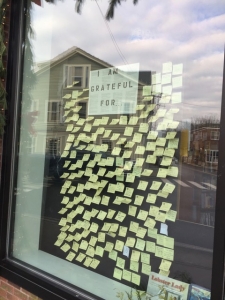Thursday, December 28, 2017

Grateful in Mystic, CT
The evidence that people have hope for a more peaceful and compassionate world can pop up at some unexpected moments. Our local independent bookstore, Bank Square Books, is offering an unusual window display as we make our way through the holidays. Rather than using precious window display space to tempt the passerby to buy beautiful books, they have created a tableau of hundreds of small, yellow post-it notes – each describing something the contributor is grateful for. From across the street, it looks like a constellation of tiny square stars. Up close, it is delightful collage of how people pay attention to goodness surrounding us.
At the end of this unsettling and frightful year, this window is a small oasis in the middle of downtown for the community to eavesdrop on a collective sprinkling of grateful moments, each just a few words. David Schiller says in The Little Zen Companion that words can never be a substitute for experience. “Reading about fruit just isn’t the same as biting into a warm peach. But give the words time to work, and you might find – not the truth, but a glimpse.”
Many people are struggling to survive tragedies, abuse, precarious life situations, and how to understand what actually is true. What action can we participate in that will keep our sense of communal hope alive when one tragedy is followed by another and another?
After the mass shooting of children and teachers in Newtown, Connecticut, Deepak Chopra offered some suggestions for behaviors that can give hope to those who are suffering and feeling hopeless. He suggests that we should pause over the choices that everyone can make as an aid to healing:
“Hold each other in loving awareness.”
“Speak gently.”
“Resist viewing negative images over and over.”
“Walk away when the conversation contains negativity.”
“Keep your life as structured as possible — especially when dealing with children in the aftermath of tragedy.”
“Try not to be alone — allow friends to offer consolation even when being around others is painful.”
“Forgive yourself when you feel like a victim, but take steps to grow out of victim thinking.”
“Allow for someone else’s point of view. It is difficult to express inner pain, and we all do it imperfectly. What may seem like anger and frustration from others is often the best they can do.”
“Because it reaches so deep, your sense of suffering may be subtle, like a gray fog rather than a sharp physical wound. To truly judge how healing is progressing, it is important to do more than regain everyday normality.”
“Become involved in your own healing, let time be your ally, and go as deeply as you can into the reservoir of peace that lies inside you.”
Indigenous Ojibwe people say, “Sometimes I go about in pity for myself, and all the while a great wind is bearing me across the sky.”
I felt a gust of hope when I passed the window at the bookstore with its unexpected display of hope in the window. What a wonderful present to begin a new year! What a feast of words for the heart! Thank you!
Ruth W. Crocker is the author of Those Who Remain: Remembrance and Reunion After War and People of Yellowstone. She lives and writes in Mystic, Connecticut.